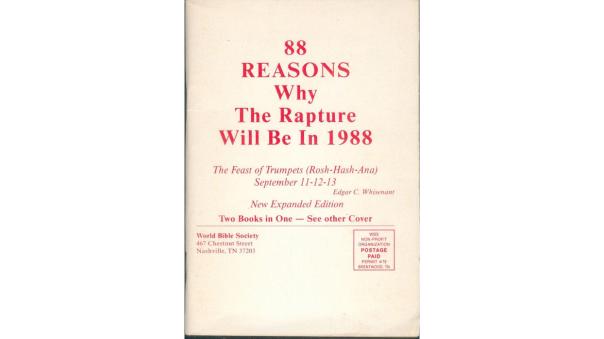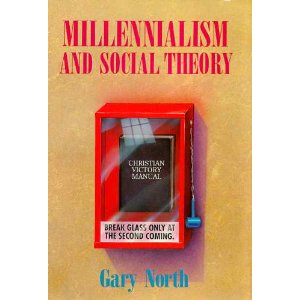Someone on Gary North’s discussion forums this past week posted that he had recently “converted” to Christian Reconstructionism from premillennial dispensationalism. This, of course, now makes him a contrarian in almost every sense of the word. He said he is now the only member of his circle of family and friends to hold this position theologically and eschatologically.
His dilemma (and his question) is this: how to persuade members of his family and at least some of his friends that their position is wrong and his position is right? Ah, yes…
“How to Lose Friends and INFURIATE People!”
Hmmm. Sounds like a similar dilemma and question when one becomes a new, evangelically-born Christian. Suddenly, you have (by God’s grace) awakened from a deep spiritual slumber. You’ve been raised from the dead and rescued from certain everlasting damnation, and given new life and a new purpose. You feel (and think) like a new man. That’s because you are. You know you have a truth that is THE truth (and not just “your” truth.) The Gospel becomes like a fire shut up in your bones. You can’t keep it to yourself. You have to tell others. You want to tell EVERYBODY within earshot. JESUS is LORD and Savior and King! Believe in Him and be saved, too. Have peace with God, forgiveness of sins, everlasting life and joy and fellowship with all the redeemed in Christ and joy and peace and radiant and abundant personal fulfillment in spite of your evergreen and enduring Adamic affinities in this life, and so much more.
Who wouldn’t want that?
Well, my fellow Calvinistic, sovereign-election-embracing, total-depravity-acknowledging Christian, not everybody!
In the same way that non-Christians whom God has not been pleased to grant an irresistible attraction to the Gospel of grace in Christ are not all that interested or enthused by your new-found, let-me-tell-you-all-about-what-God-did-for-me-through-His-Son-Jesus “fanaticism,” likewise, non-Reconstructionists, whom God has not been pleased to grant — well, anyway — who are not only not interested in your new-found, “unorthodox,” borderline-heretical, overly optimistic, evangelically-incorrect belief system and worldview, they are incensed by it.
You have gone to the dark side. You have defected from the safe haven of Rapture-and-tribulation-focused, eschatologically emasculated, piously pessimistic, conservative, culturally-defeatist, evangelical Christianity.
In other words, you’ve been a BAD boy!
At least, that’s how it looks when they are in the majority and you are in the minority — a teensy-weensy (but slowly growing) minority. Their sense of validation and biblical superiority is based solely on the fact that they outnumber you. Their favorite Bible teachers and preachers all teach some form of pietism-premillennialism-dispensationalism. All the Christian radio and TV stations they tune into teach it. Probably, their pastors all teach and preach it. Therefore, most (if not all) of their Christian friends — and relatives — believe it. Therefore, it MUST be true.
For the most part, folks who hold to dispensationalism do so because that’s been the prevailing alternative to the anemic amillennialism of most reformed, liturgical protestant and Roman Catholic churches.
Regardless of what tradition you came out of, when you become a “Bible-believing” conservative evangelical or mainline pentecostal committed to biblical inerrancy, premillennial dispensationalism is pretty much what you are expected to believe — otherwise, you’re a LIBERAL!
And even if you’re a dedicated, conservative Calvinist, chances are you’ve shed dispensationalism and adopted a more robust covenantalism, but you have still retained the pessimistic eschatology of premillennialism (i.e., Satan reigns now, Jesus will reign later).
The Question
Anyway, here is the question, verbatim, posted by this person:
I was recently “converted” to the reconstructionist/postmillennial view of Scriptures. I am the only only person in my family who holds this viewpoint. All of my family and Christian fellowship from the past are the dispensational types. For the most part they are all heavily invested into thinking about the “end times.”
I am not really one who likes to debate and argue, but at the same time, I do not like seeing them being affected by this subtle (or sometimes not so subtle) worldview of defeat. Most of them are just “hunkering down” and waiting for Christ to return. They have no ambitions for productivity. They wouldn’t say that, but that’s how they live.
What are some good ways to be an influence on my family and friends in trying to help them see the hope that is in the Reconstructionist view of scripture and life? What are some good questions to ask to get them thinking about their assumptions?
The Answer
Here is Gary’s answer. Pay close attention to the action steps prescribed here. They can be applied to virtually any situation where you hold to a certain set of beliefs and the majority of people around you hold to another. He does not say to marshall your forces to do intellectual and rhetorical battle with your ideological (but not spiritual) foes. Rather, he says, put your theology where your mouth is. That includes your eschatology. Live it out so that others — especially the ones you’re trying to persuade and hoping to convince — can and WILL see the real, visible difference that it makes.
Hunkering down is the preferred way of life for the vast majority of people. This will not change. It’s Pareto’s law: the ineffective 80%.
You perceive that their eschatology is a root cause of their lack of initiative. But is it? It may be the other way around. They are just normal people, hunkered down, and their eschatology comforts them. It tells them that this is all they should expect. You want to take this excuse away from them. You will encounter resistance. If you are not rich or famous, they will say to themselves: “What does he know?” What is your answer?
So, the best way to handle this is by word and deed.
First, achieve some obvious success.
Second, produce materials that show how you did it. This includes your views on eschatology. Write a short a book on eschatology and success. Explain why eschatology does not promote or justify a lack of success. Aim this book at somebody who is about 15 years old. Do not target your relatives. Your relatives do not want to hear it. Your relatives do not want to be reminded by you that they are underachievers due to their eschatology. Publish this book by print-on-demand.
Third, produce a series of video lessons that could be used in a Sunday school. Explain your position. Post these on YouTube. I recommend a 12-week series of lessons, each about 25 minutes long. Use a screencast program to do it, with a presentation graphics program such as the one in Libre Office. Buy a good lapel microphone. Buy a good webcam for $70 or so.
Fourth, set up a WordPress.com site. Post the videos on the site as embeds.
This way, when somebody asks you what you believe, hand him a book, and then hand him a short link created by Bitly.com or TinyURL.com that takes the person to your video series on eschatology. If the person is interested, he can find out what you believe at his own pace. He can listen, review it, or ignore it. He does not have to listen to you tell him face to face.
He listens to you teaching teenage kids, which is a completely different positioning. He does not feel threatened. You are not targeting him because he is a failure. You are targeting young people to help them not become failures. The positioning is completely different. Everybody wants kids to be successful. It is just that few people want to pay the price personally to be successful and to be a role model for kids. He expects his own kids to do what he has not done, despite the fact that he has taught his kids erroneously.
If you are positioning the materials to help teenagers do better in their lives, it is very difficult for anyone to criticize you. Ignore your relatives. Why? Because they surely ignore you. Treat them in exactly the same way. Target a completely different audience, and then, if a few of your relatives are curious about what you have been doing, you can hand them the book and a link to your blog site, which has your YouTube videos embedded in it.
Again, there’s no strategy of full-spectrum theological dominance here. Just a practical program of, “Don’t tell me, show me!”
To subscribe to Gary North’s website, click HERE!)
Forum question and answer reprinted by permission.


